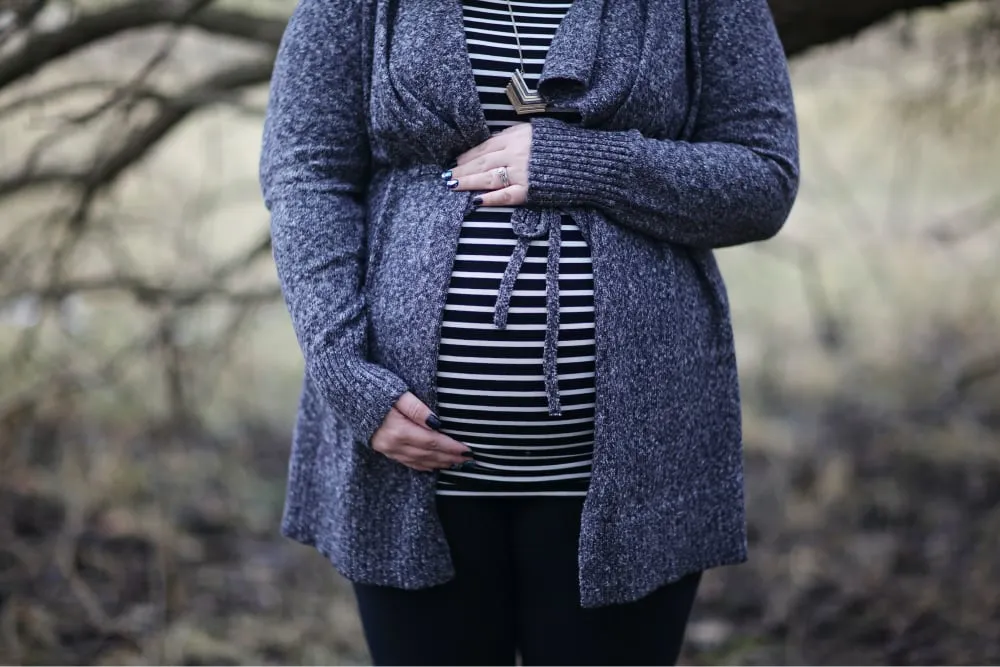Complications of disordered eating during pregnancy
Disordered eating and eating disorders can lead to several harmful consequences for the birthing parent and the baby, but seeking treatment as soon as possible can help rectify some of these risks and promote nutrition, healthy weight gain, and a healthier relationship with food.
Risks for the pregnant person
Some potential risks for a pregnant person with an eating disorder may include: (2,3)
- Psychological distress
- Postpartum depression
- Anemia
- Increased risk of hyperemesis gravidarum (excessive nausea and vomiting that may require hospitalization)
- Poor nutrition
- Dehydration
- Gestational diabetes
- High blood pressure
- Premature birth
- Labor complications
- Nursing problems
- Heart issues
It’s important to remember that many of these risks for the pregnant parent may negatively impact the baby’s health and development, especially if they become life-threatening.
Risks for the fetus
Eating disorders not only affect the pregnant person but the developing fetus as well. Possible fetal complications include: (2,3)
- Low birth weight
- Respiratory distress
- Poor development
- Premature birth
- Feeding issues
- Miscarriage
- Microcephaly (small head)
- Premature labor
Not all of these risks will apply to everyone, as each type of eating disorder comes with its own possible fetal complications.
Patients with eating disorder behaviors may have significant struggles with food, placing them at risk for development of high blood pressure and gestational diabetes.3 If a pregnant person is unable to control their gestational diabetes, this can cause the fetus’ blood sugar to be too high and for the baby to grow too large. A baby that is too big can cause delivery issues for both the delivering parent and the baby.4
An individual struggling with bulimia nervosa may experience irregular heartbeat, electrolyte imbalances, and dehydration. (3) Dehydration can lead to complications, such as low amniotic fluid, low breast milk production, and premature labor. (5)
A pregnant individual who has anorexia nervosa may be underweight and not gain the appropriate amount of weight during pregnancy. This could lead to low birth weight as well as other health problems for the baby. (3)
Seeking eating disorder treatment during pregnancy
Many pregnant people with eating disorders may refrain from disclosing their eating disorder to their healthcare provider, but this can increase the risk of both parental and fetal complications. However scary it may be, the safest route is to disclose this information to a medical professional so the pregnant person can receive quality eating disorder treatment as soon as possible. The faster that care can be provided the better the outcome of the pregnancy.
Here are some tips for recovering from an eating disorder during pregnancy:
- Strive to be as honest and forthcoming as possible with your healthcare provider about any past or present eating disorders or disordered eating—if they aren’t sensitive or don’t seem to be experienced in treating people with eating disorders, seek out a different provider.
- Meet with a nutritionist who specializes in eating disorder nutrition and create a plan for appropriate nourishment and healing from the struggles you are experiencing with food throughout pregnancy and after birth.
- Schedule additional prenatal appointments, if recommended by your doctor.
- Find a therapist who specializes in eating disorder care and understands the unique struggles of recovery during pregnancy.
- Attend support group meetings where you can find a strong and empowering recovery community.
- Attend other prenatal, childbirth, or parenting classes to prepare you for this major life change.
- Consult with your doctor before attending an exercise class or creating an exercise plan for yourself to ensure that it complies with your eating disorder recovery plan. Be mindful that all exercise is not healthy for you, especially if you are experiencing an eating disorder coupled with pregnancy.
Benefits of Within’s virtual treatment program
Another option for eating disorder care during pregnancy is to enroll in a virtual treatment program that provides patients with convenient and evidence-based treatment, no matter where they live. Pregnant patients can then recover from an eating disorder without disrupting their daily life. They can continue attending prenatal appointments and classes, while attending virtual individual therapy and group counseling sessions.
Our Within treatment team has significant experience addressing the challenges of eating disorder recovery during pregnancy and offers sensitive, compassionate care.
Other benefits of our virtual treatment program include:
- Highly personalized treatment plans, tailored to meet each patient’s needs
- Inclusive, specialized eating disorder recovery programs for specific populations, such as trans and non-binary patients, queer patients, teens, athletes, and more
- Easy-to-use app
- A recovery-oriented community
- Remote medical monitoring (blood pressure cuff, thermometer, numberless scale)
- Meal delivery services
- Care Partners, who serve as mentors and support you in a highly individualized manner throughout the program
- Group meals, so patients can experience the benefit of our recovery oriented community during their healing journey
- Free weekly alumni meetings, as well as additional evidenced based group therapy are for continued support after patients complete the program
Tips for improving body image during and after pregnancy
Pregnancy can be a huge adjustment for anyone, but pregnant people who have an eating disorder or disordered eating are particularly susceptible to the struggles of bodily changes during this time. Changes in body shape or size can be triggering for eating disorder relapse. Other people can also worsen these triggers if they make increased comments about the pregnant person’s weight, make unwanted comments about body shape or size, or touch the belly without permission.
Here are some tips for improving body image during pregnancy:
- Be aware of your triggers and work with your therapist to build healthy coping skills
- Follow body-positive pregnancy accounts on social media
- Block, mute, and unfollow any harmful social media accounts
- Surround yourself with a positive and uplifting support system
- Always ask for extra help or support if you need it
- Attend a pregnancy support group, where you will interact with pregnant people of all different body sizes
- Try to reframe your concerns over body weight or shape by focusing on celebrating the growth and development of your baby
After giving birth, many people may still struggle with body image issues, especially if they are concerned their body hasn’t returned to how it looked prior to pregnancy. The influence of “mommy bloggers” touting ways to lose that post-pregnancy baby weight aren’t helping either—they only serve to stigmatize people with diverse body types and to promote unrealistic body ideals.
Compound these anxieties with the stress of being a new parent, and it’s no surprise that this can be a very distressing time for people with an eating disorder. It can be easy to fall into a pattern of obsessing over weight, stretch marks, and loose skin after giving birth, but try to remember that your body has just done something absolutely incredible, and you should be very proud. While you bond with your new baby, it can also be helpful to focus on how you plan to create a healthy and body-positive environment for your child while continuing your journey of healing.
If you or a loved one need help with disordered eating treatment, please call our clinical care team or visit our get started page to begin your healing today.








